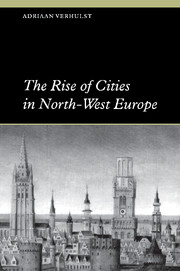Book contents
- Frontmatter
- Contents
- List of maps
- Editor's preface
- Preface
- Map
- 1 The transformation of the Roman towns
- 2 The nadir of urban life (sixth–seventh centuries)
- 3 New urban beginnings and the Viking raids (eighth–ninth centuries)
- 4 The urbanization of the high Middle Ages (tenth–eleventh centuries)
- 5 Industrialization, commercial expansion and emancipation (eleventh–twelfth centuries)
- 6 Conclusion
- Bibliography
- Index
5 - Industrialization, commercial expansion and emancipation (eleventh–twelfth centuries)
Published online by Cambridge University Press: 05 June 2012
- Frontmatter
- Contents
- List of maps
- Editor's preface
- Preface
- Map
- 1 The transformation of the Roman towns
- 2 The nadir of urban life (sixth–seventh centuries)
- 3 New urban beginnings and the Viking raids (eighth–ninth centuries)
- 4 The urbanization of the high Middle Ages (tenth–eleventh centuries)
- 5 Industrialization, commercial expansion and emancipation (eleventh–twelfth centuries)
- 6 Conclusion
- Bibliography
- Index
Summary
The urbanization process which began to manifest itself in major topographical changes and in the spread of existing cities as well as in the emergence of new cities in the tenth and particularly in the eleventh centuries, as dealt with in the previous chapter, also had important economic, social and institutional aspects which we have scarcely touched upon so far owing to a lack of written sources prior to the eleventh century. Only from the eleventh century onwards is it possible to say something about the inhabitants of these cities: their origin and statutes, their organization and administrative position in the city and vis-à-vis the city's original lord and master – bishop or sovereign (prince, territorial monarch) – and their commercial and industrial activities and organization, especially as regards long-distance trade. This chapter deals with all these aspects of the urban community. Chronologically it covers the eleventh and twelfth centuries. Towards the end or sometimes even in the middle of the twelfth century, a development was completed which may have begun in the tenth century but which can only be studied from the beginning of the eleventh century because of a lack of sources. From the middle of the twelfth century and especially at the end of that century, new social, institutional and economic developments began which only had their full impact in the thirteenth century and so fall outside the chronological confines of this book.
- Type
- Chapter
- Information
- The Rise of Cities in North-West Europe , pp. 119 - 148Publisher: Cambridge University PressPrint publication year: 1999



